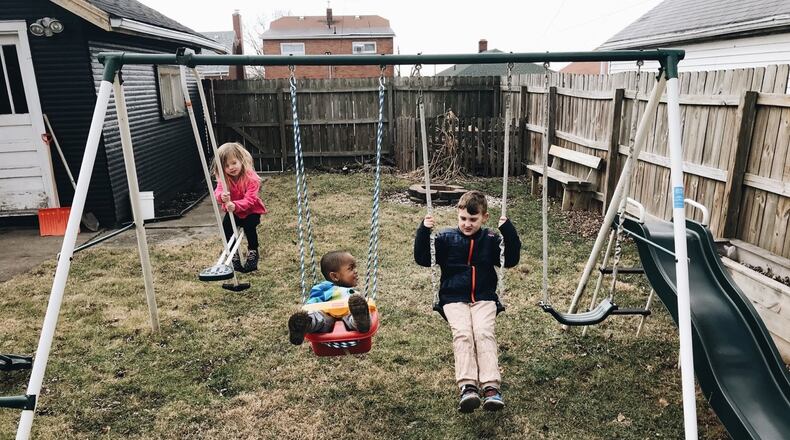The nonprofit Safe Families for Children, which has a Dayton chapter, has a voluntary program where families can have their children stay with screened volunteer host families.
The program is geared toward parents who might not have families or friends in their social circles that they can lean on to help care for their children.
Mindy Braun, Dayton chapter director, said the local chapter’s goal is to work with families facing issues such as homelessness, going through rehab or having a medical problem. Host families go through a vetting process similar to foster care.
“We’re providing safe and loving homes for these kids to be hosted while parents work through a crisis,” Braun said.
RELATED: How to become a foster parent in Ohio
She said parents that get help from the program stay in contact with host families and their children with visits and phone calls.
“Maintaining that family circle is so important to us,” said Braun, who is also a host through the program.
Safe Families is in 108 cities and has been challenged in some places, such as in Colorado where the organization received a cease and desist letter in April from the state government asserting it was an unlicensed child placement agency.
The proposed Ohio law would create a state-level framework that would define the type of work Safe Families does as legal.
This comes as foster care agencies are struggling with increased costs fueled by the opioid crisis. Montgomery, Greene, Warren and Miami counties saw the total number of kids removed from homes increase nearly 20 percent from 2013 to 2017. Removals dropped last year, just as overdose deaths peaked in 2017 and then declined in 2018.
RELATED: Foster care system struggles to keep pace with opioid epidemic
Safe Families has chapters in Dayton, Cleveland, Columbus and Cincinnati. The Dayton chapter started in 2017 and has hosted children for about 1,000 nights. The chapter has hosted 18 children from one month old to 11 years old, though families are capable of hosting children up to 18 years old.
“The host family provides a temporary place for children to stay and give parents peace of mind so they can focus on getting back on their feet,” said Sen. Bill Coley, R-Liberty Twp., a sponsor of Senate Bill 6 along with majority whip Sen. Jay Hottinger, R-Newark.
The bill was referred to the Ohio Senate Health, Human Services and Medicaid Committee, which started hearings last week.
Safe Families was founded in Chicago 15 years ago in response to an overwhelmed foster care system. Advocates say the program doesn’t take the place of foster care, but fills a service gap by helping families who otherwise would not be able to get this type of help, since foster care is for children that have been abused or neglected and taken from the home. The program’s goals include preventing child abuse and neglect, which can reduce the number of children entering foster care.
Chris Combs, with Coalition of Care, a Cincinnati Safe Families chapter, said chapters work with local children’s services agencies. He said there have been 21,000 child nights hosted so far by the Cincinnati chapter.
“In some cases it is keeping children out of the foster system and lightening the system,” Combs said.
THE PATH FORWARD
In Sunday’s paper, we revealed that area foster care programs are being pushed to the breaking point by the opioid crisis. This story looks at a proposal that could address that problem. This is part of our Path Forward initiative exploring solutions to the region’s most pressing problems, including the opioid epidemic.
About the Author
